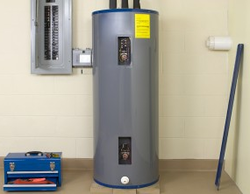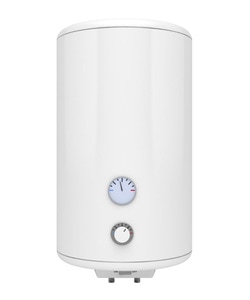Water Heater Plumbing Service in Boise, Idaho
At Boise Valley Plumbing in Boise, Idaho we have the expertise to help you decide which water heater will meet your hot water needs and budget.
Installing a water heater maintenance, repair, and replacement should be done by a plumbing professional as you are dealing with many gallons of hot water. Trying to fix a minor problem could result in a bigger problem. Often a poorly performing water heater only needs to be flushed, or requires maintenance. Choosing a master plumbers help homeowners explore their options. Regardless of the homeowner's choice, we can repair and existing or install a new hot water heater quickly at a fair price. We will haul away the old heater as well. We also do general plumbing, sewer and drain work, and gas and electric repiping. Removing your old hot water heater and installing a new one is not a project for the handy homeowner. The combination of hot water, electrical wires and gas can be extremely dangerous. Water heaters are often installed incorrectly. Each manufacturer and model has specific guidelines that need to be followed for safety and to meet warranty requirements. The plumber has to be well versed in both water and gas piping. Be sure that the plumber you select is a master plumber with years of experience. We will diagnose the problem and carefully explain all your options with solid estimates. Our plumbers will review the types and sizes of hot water heaters available, so you can make an informed decision. Then we will promptly and efficiently install the water heater carefully meeting warranty standards. When flushing a water heater, you are dealing with gallons of super heater water. Having your system flushed by a seasoned plumbing professional will lengthen the life of your water heater and keep the hot water flowing. |
Schedule a Master Plumber Now! |
Seven Signs Your Water Heater Needs Attention
Water temperature is too hot or too cold. This can be adjusted using the thermostat on the front of your water heater. Depending on the size of your water heater, it could take a day or two to notice the change.
You keep running out of hot water. This can be a sign your water heater to be flushed or pipes need to be replaced. The final solution may be replacing your water heater, if these do not work.
No hot water is coming from your water heater tank. This could be a sign of a broken heating element or gas thermocouple. This can be a DIY project or can be replaced at a small fee from Boise Valley Plumbing Service.
Knocking, whining or banging sounds are coming from your water heater. This could be a sign of sediment build up in your water heater tank. If the noise continues after flushing the tank, it could be a failing heating element.
Rusty or dark water comes out of your faucet. This can indicate your water heater is reaching the end of its life span. Especially, there are multiple water users.
The temperature of your hot water is not the same every time you turn on the hot water. This is a sign your water heater is wearing out.
You have had your water heater for a long time. The average water heater has a 5 or 10 year warranty, but sometimes they can last up to 15 to 20 years. Heavy use, water condition, maintenance schedule, and a bit of luck can affect how long a water heater will last.
There is water around the water heater that seems to be from a leak. Call a plumber immediately before it causes damage to the water heater and your property. Small leaks can also create a great home for a mold colony.
You keep running out of hot water. This can be a sign your water heater to be flushed or pipes need to be replaced. The final solution may be replacing your water heater, if these do not work.
No hot water is coming from your water heater tank. This could be a sign of a broken heating element or gas thermocouple. This can be a DIY project or can be replaced at a small fee from Boise Valley Plumbing Service.
Knocking, whining or banging sounds are coming from your water heater. This could be a sign of sediment build up in your water heater tank. If the noise continues after flushing the tank, it could be a failing heating element.
Rusty or dark water comes out of your faucet. This can indicate your water heater is reaching the end of its life span. Especially, there are multiple water users.
The temperature of your hot water is not the same every time you turn on the hot water. This is a sign your water heater is wearing out.
You have had your water heater for a long time. The average water heater has a 5 or 10 year warranty, but sometimes they can last up to 15 to 20 years. Heavy use, water condition, maintenance schedule, and a bit of luck can affect how long a water heater will last.
There is water around the water heater that seems to be from a leak. Call a plumber immediately before it causes damage to the water heater and your property. Small leaks can also create a great home for a mold colony.

When a water heater must be replaced, homeowners can now choose between tankless or traditional models. Tankless are smaller, heat continuously, so you never run out of hot water.
With a warranty of 10 to 20 years, the stainless steel hot water heater will last twice as long as the tank water heaters. However, they also cost 3-4 times more than traditional tank water heater, after installation. Tankless owners usually can only do one activity that requires hot water at a time. For example, the homeowner would have to choose between a hot shower and running the dishwasher.
When a water heater must be replaced, homeowners can now choose between tankless or traditional models. We can help you decide whether a tankless or traditional water heater is best for your needs.
Tankless hot water heaters are smaller and heat continuously, so you never run out of hot water. With a warranty of 10 to 20 years, the stainless steel hot water heater will last twice as long as the tank water heaters. However, they also cost 3-4 times more than traditional electric or gas water heater, after installation. Tankless owners usually can only do one activity that requires hot water at a time. For example, the homeowner would have to choose between a hot shower and running the dishwasher.
Traditional hot water heaters are less expensive to purchase and have installed. They have reservoir of water, so a homeowner could take a shower and wash clothes on hot. The tank water heaters do have to be replaced more often and when they are empty, the homeowner's water is cold until the water heater has had time to recycle.
With a warranty of 10 to 20 years, the stainless steel hot water heater will last twice as long as the tank water heaters. However, they also cost 3-4 times more than traditional tank water heater, after installation. Tankless owners usually can only do one activity that requires hot water at a time. For example, the homeowner would have to choose between a hot shower and running the dishwasher.
When a water heater must be replaced, homeowners can now choose between tankless or traditional models. We can help you decide whether a tankless or traditional water heater is best for your needs.
Tankless hot water heaters are smaller and heat continuously, so you never run out of hot water. With a warranty of 10 to 20 years, the stainless steel hot water heater will last twice as long as the tank water heaters. However, they also cost 3-4 times more than traditional electric or gas water heater, after installation. Tankless owners usually can only do one activity that requires hot water at a time. For example, the homeowner would have to choose between a hot shower and running the dishwasher.
Traditional hot water heaters are less expensive to purchase and have installed. They have reservoir of water, so a homeowner could take a shower and wash clothes on hot. The tank water heaters do have to be replaced more often and when they are empty, the homeowner's water is cold until the water heater has had time to recycle.
